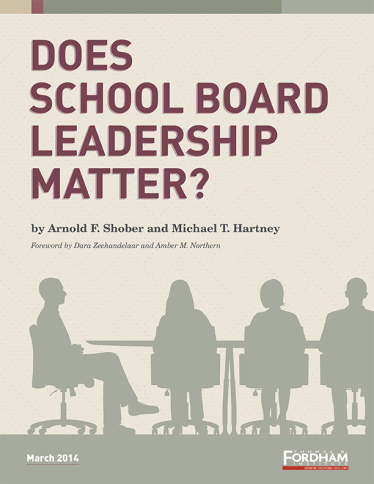School boards actually do matter
Chester E. Finn, Jr.My doubts and disgruntlements with elected local school boards span three decades.
Does School Board Leadership Matter?
Arnold F. Shober, Michael T. HartneyAre the nation’s 90,000-plus school board members critical players in enhancing student learning? Are they part of the problem? Are they harmless bystanders? Among the takeaways are the following:
A concluded battle in the curriculum wars
Mark BauerleinIn the Hoover Institution’s Defining Ideas journal, Tom Loveless has a brief, measured examination of today’s curriculum debates.
The New Opportunity to Lead: A vision for education in Massachusetts in the next 20 years
Chester E. Finn, Jr.[[{"fid":"113130","view_mode":"default","fields":{"format":"default","field_file_image_alt_text[und][0][value]":"","field_file_image_title_text[und][0][value]":""},"type":"media","attributes":{"height":328,"width":500,"style":"width: 170px; height: 112px; float: right;","class":"media-el
A bad headline on ‘bad apples’
Michael J. Petrilli, Brandon L. WrightThere’s a lot of talk about accountability in education today; schools are held accountable, teachers are increasingly held accountable. But what about education PR firms?
We all have a stake in ensuring the Common Core debate rests on facts
Kathleen Porter-MageeYesterday, National Review Online posted an article entitled, “The Eleven Dumbest Common Core Problems.” This is the latest in a series of posts making their way around the internet aimed at demonstrating how the Common Core ELA and math standards are &
Encouraging integrated schools in the District of Columbia?
A discussion on the merits and pitfalls of "controlled choice" Join the discussion on our website or on Twitter #ControlledChoice.
Encouraging integrated schools in the District of Columbia?
A discussion on the merits and pitfalls of "controlled choice" Join the discussion on our website or on Twitter #ControlledChoice.
There’s a new sheriff in town: Louisiana judges Common Core alignment
Kathleen Porter-MageeAs followers of the Common Core debate know all too well, when it comes to the veracity of publishers’ claims of “Common Core alignment,” the most we supporters have been able to offer in the way of advice is: “buyer beware.”
Five takeaways from Race to the Top Year-Three reports
Today, the U.S Department of Education released Year-Three reports on the 12 states that won funding via Race to the Top’s first two competitions. Here are the five things that jumped out at me.
IES on SIG: Troubling foreshadowing
Late last year, the U.S. Department of Education’s independent research arm, the Institute of Education Sciences (IES), released a preliminary but highly informative report on the School Improvement Grant program (SIG).
New Indiana standards mark a shift away from content
Jeremy A. SternFor many years, Indiana has been a leader in providing rigorous, content-rich K–12 expectations. But lately, the state seems to be taking worrying and entirely unnecessary steps backward.
Hope for Common Core implementation
The Fordham Institute’s new report Common Core in the Districts paints a vivid picture of four different school districts’ efforts to implement the Common Core State Standards.
The outer limits of school choice
Jeff MurrayWhen we talk about educational choice on these pages, we are mostly speaking of charters, vouchers, digital learning, and the like. But in Fordham’s home state of Ohio, educational choice encompasses several other options, of which many families regularly avail themselves. Two of those “outer-limits” options have been in the news recently.
Not a walk in the PARCC, but still the best path for Ohio
Chad L. AldisTwo pieces of pending legislation promise to derail long-planned changes to K-12 testing in Ohio if passed; we take a look at the implications of holding the line vs breaking ranks.
E-schools drive Ohio’s charter-school growth
Aaron ChurchillOnline charter schools have been the primary driver of sector growth; with a number of implications
Common Core 'spring training': Maintain realistic expectations
Amber M. Northern, Ph.D., Michael J. PetrilliEveryone knows that the Common Core State Standards initiative has turned into a political football. But a more apt analogy might be baseball—spring training, to be exact. That’s because, for all the colorful commentary, the Common Core is still in the very earliest phases of implementation.
Standards, the free market, and education reform
Yesterday, Kathleen discussed the relationship between standards and choice, ultimately arguing that these two movements ought to operate as complements, rather than antagonists.
The Effect of Co-Locations on Student Achievement in NYC Public Schools
New York mayor Bill de Blasio has made clear his aversion toward charter schools, singling out in particular his predecessor’s policy of allowing charter schools to co-locate with the city’
How Well Aligned Are Textbooks to the Common Core Standards in Mathematics?
Alyssa SchwenkJust because the label on that pint of ice cream says it’s “fat free” doesn’t mean it won’t expand your waistline—and just because a textbook is labeled “Common Core aligned” doesn’t mean it actually covers the material it’s supposed to.
Common Core in the Districts: An Overview
Preparation is key to any successful team’s run to the playoffs and a World Series championship. Spring training gets players in game shape. Teams play exhibition games, trying out prospects and going through different scenarios to be as prepared as possible before the season gets underway.
4 Takeaways from SXSWedu
Michelle LernerThe SXSWedu portion of the famously cool SXSW festival is the oddball segment, as evidenced by the early start and the attendees actually wearing suits. Besides the un-SXSW vibe of SXSWedu, there were a ton of takeaways for policy wonks. Here are four key ones:
4 Takeaways from SXSWedu
Michelle LernerThe SXSWedu portion of the famously cool SXSW festival is the oddball segment, as evidenced by the early start and the attendees actually wearing suits. Besides the un-SXSW vibe of SXSWedu, there were a ton of takeaways for policy wonks. Here are four key ones:
Chris Cerf: In appreciation
Last week, Chris Cerf stepped down after three extraordinarily successful years as New Jersey’s commissioner of education. Education observers in the Garden State and beyond will remember his tenure for its major initiatives.






